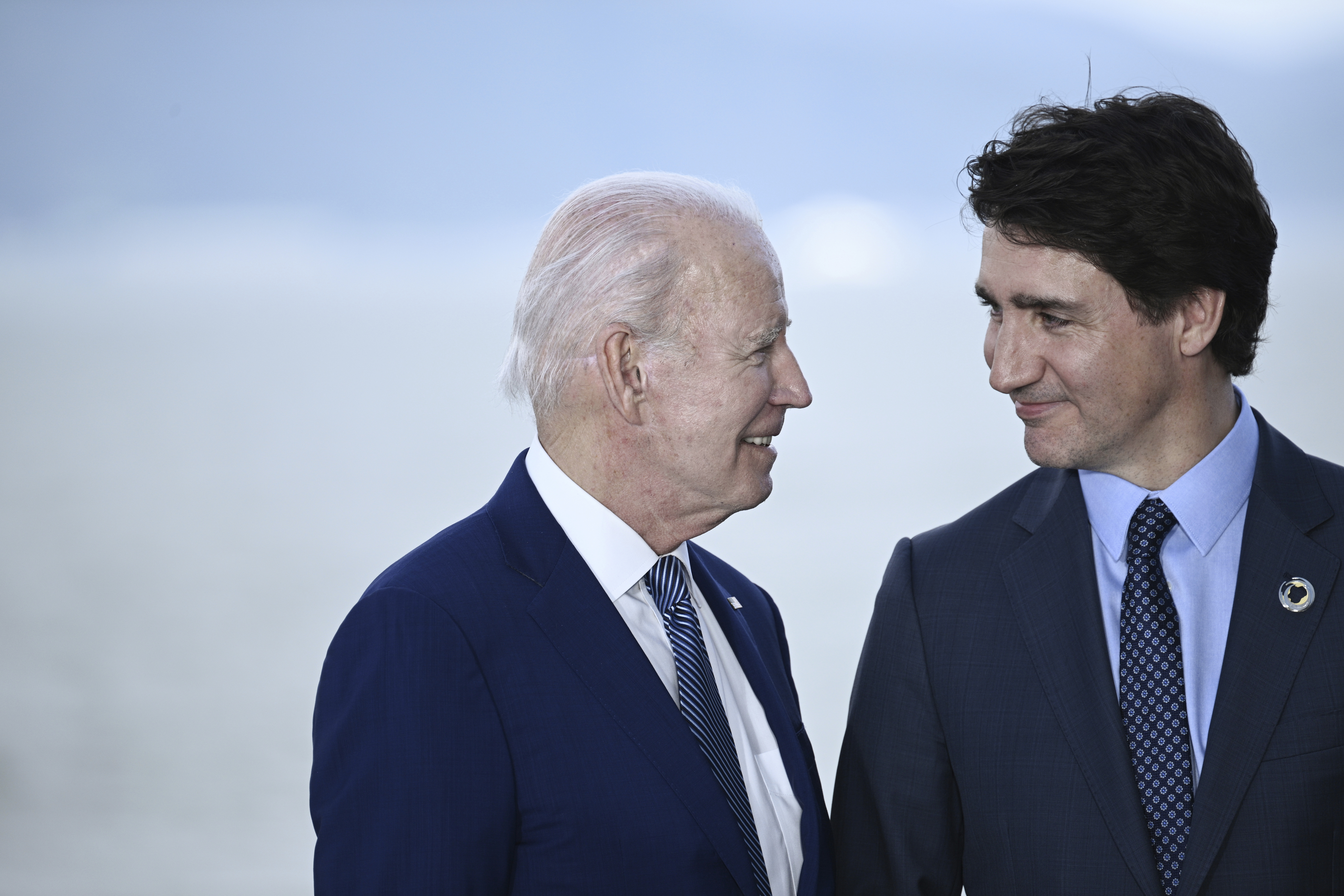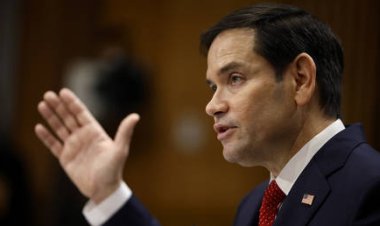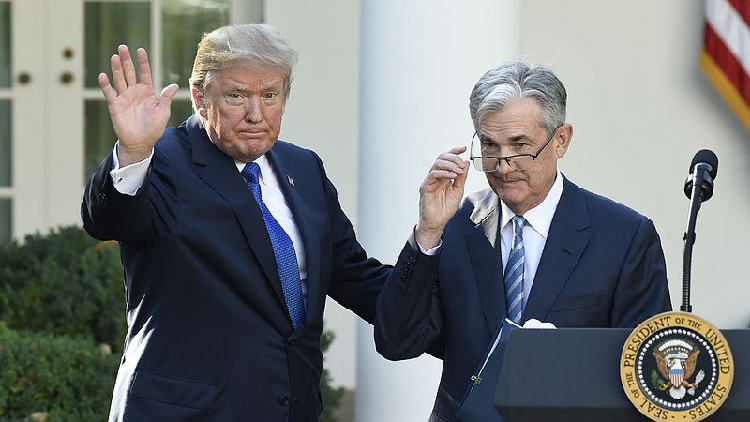‘Doing a Biden’: A Global Codeword for Removing Leaders Past Their Prime
As national elections approach, Japan's Fumio Kishida, Canada's Justin Trudeau, and Germany's Olaf Scholz are all under pressure to emulate the actions of the U.S. president.

In the months since Biden's withdrawal, at least three unpopular leaders with upcoming national elections—Japanese Prime Minister Fumio Kishida, Canadian Prime Minister Justin Trudeau, and German Chancellor Olaf Scholz—have found themselves under considerable pressure to follow suit.
This was exemplified when the German magazine Der Spiegel questioned, “Why isn’t Scholz doing a Biden?” after a series of regional electoral defeats, suggesting that the chancellor “would be doing his party, his country and himself a favor” by stepping down. Following Biden’s announcement, Canadian broadcaster CBC asked, “Could Trudeau go next?” Meanwhile, an expert noted that Kishida was “having a Biden moment” when he resigned from his party leadership last month.
While discontent with political leadership is a common issue, the unique circumstances in each country complicate the situation: Kishida was already in a precarious position before Biden's departure, and it's uncertain whether Scholz or Trudeau will yield to internal party pressure as Biden did.
The use of Biden as a reference point in Tokyo, Ottawa, and Berlin highlights how his July decision has created a global precedent for politicians making the unexpected choice to relinquish power voluntarily.
**Choppy Political Waters Ahead**
Although Kishida, Trudeau, and Scholz operate in distinct political environments, they are navigating similar terrain, facing increasing pressures from within their respective parties to consider resigning.
All three leaders, who are deep into their terms and increasingly unpopular, have faced intense scrutiny from their parties—Japan's Liberal Democratic Party, Canada's Liberals, and Germany's Social Democrats—regarding their fitness to lead in the national elections scheduled for next year.
Kishida, who first assumed the role of Japan’s prime minister and leader of the LDP in 2021, has seen his approval ratings plummet amid various corruption scandals impacting his party. Recently, Kishida’s LDP chose a new president, leaving him out of the running.
Speculation about Kishida's potential departure from his party's leadership intensified after Biden's exit. An LDP official expressed to the Asahi Shimbun, “Biden is out and Kishida should retire quickly and honorably, too,” while a cabinet member indicated to the Japan Times that party leaders should monitor the effects of Biden's withdrawal closely.
In mid-August, shortly after Biden's decision, Kishida surprised many by announcing he would step down as his party’s top candidate. “It is necessary to firmly present a newly born LDP to the people,” he stated at a press conference. “The most obvious first step to show that the LDP will change is for me to step down.”
Scholz, who took the helm from Angela Merkel just two months after Kishida, finds himself struggling for political survival amid record-low approval ratings. Like Biden, he has faced calls to allow for new leadership within the center-left SPD as next year's federal elections approach.
"There is a deep disappointment with the government, with the coalition and with Scholz," said Peter Matuschek, chief political analyst at the German polling firm Forsa. This discontent arises from the ongoing impacts of the Ukraine war on Germany and internal strife within Scholz's three-party coalition. Earlier this month, a poll from ARD indicated that Scholz's approval rating hovered around just 20 percent.
Voters have expressed their dissatisfaction at the polls this year, particularly evident in June's European Parliament elections where the SPD’s support was nearly halved compared to its 2021 results. Regional elections earlier this month in Thuringia and Saxony further showcased the party’s decline, leading to intensified calls for Scholz to resign, often referencing Biden’s actions.
In its politics newsletter, Spiegel remarked, “The chancellor could follow the example of U.S. President Joe Biden: Instead of clinging to power and letting himself be taken apart piece by piece in the coming months, he is clearing the way for a new political start.”
Political discussions in Berlin have begun to eye Boris Pistorius, Scholz's defense minister, as a potential successor, given his sustained popularity. Some party members have begun advocating publicly for Pistorius as a chancellor candidate, with Munich’s Mayor Dieter Reiter stating, “The SPD must think about Pistorius as a candidate for chancellor.”
Recent polling from Matuschek’s Forsa revealed that two-thirds of German voters, including 63 percent of those who supported the SPD during the last federal election, believe Scholz should step aside for Pistorius.
Meanwhile, Trudeau faces scrutiny regarding the longevity of his third term as prime minister. Since assuming office in 2015 with promises of “real change,” he has faced multiple scandals and witnessed his party's support diminish significantly during both the 2019 and 2021 elections.
A special election in June for a Toronto-area seat that the Liberals had held for 30 years indicated more significant troubles for Trudeau's party. This election, shortly before Biden's notable debate performance, prompted comparisons between the two leaders’ tenacity in holding onto power.
Following another special election defeat in his home region of Montréal, Trudeau faced escalating demands for resignation. The analogy to Biden’s situation was again invoked, with one columnist asking, “Is it time for Justin Trudeau to Be Like Joe?”
Some commentators extended this metaphor to other Canadian political figures, questioning whether anyone in the Liberal Party could effectively persuade Trudeau to reconsider his position. “I don’t know that we have an equivalent of a Nancy Pelosi here,” remarked Canadian political analyst Lori Turnbull, “who would bend his ear and have that tough conversation in a way that would really be impactful on him.”
While Canada’s next parliamentary elections are set for fall 2025, Trudeau's primary opponents, the Conservatives, have been trying to expedite the timeline. In a recent attempt to trigger snap elections, Conservative leader Pierre Poilievre introduced a vote of no confidence in parliament.
**Avoiding Biden’s Fate?**
Among the three leaders facing this mounting pressure to emulate Biden, only Kishida has stepped back. Both Trudeau and Scholz continue to maintain their positions and do not appear inclined to resign anytime soon.
"I'm not going anywhere,” Trudeau declared earlier this month. “I’ve got a fight to lead against people who want to hurt this country, who want to hurt our communities and who want to take the country in directions that, quite frankly, are exactly the opposite of where the world needs to go.”
In Germany, the SPD's narrow victory in last Sunday’s regional vote in Brandenburg could offer Scholz a temporary reprieve from inquiries regarding his political future. In response to the state election results, he expressed, while at the U.N. General Assembly in New York, that he and his party “will repeat what happened in Brandenburg and what we succeeded at doing in the last federal election: that is, that the SPD is the strongest party in the running.”
However, doubts remain about his viability as the party's standard-bearer in next year's elections, particularly since the belief is that the SPD’s recent success occurred in spite of Scholz rather than due to his leadership. With a looming budget confrontation among coalition members, one leader referred to this period as the "autumn of decisions," which may threaten the stability of Scholz's government.
Sudha David-Wilp, a senior fellow at the German Marshall Fund’s Berlin office, commented, “I don’t think there will be immediate calls to change tactics for the SPD. Now that these three crucial state elections are behind them, it’s not going to happen immediately like some have thought.”
Contributions to this report came from Kyle Duggan, Nick Taylor-Vaisey, Matthew Karnitschnig, and Nette Nöstlinger.
Sophie Wagner contributed to this report for TROIB News












